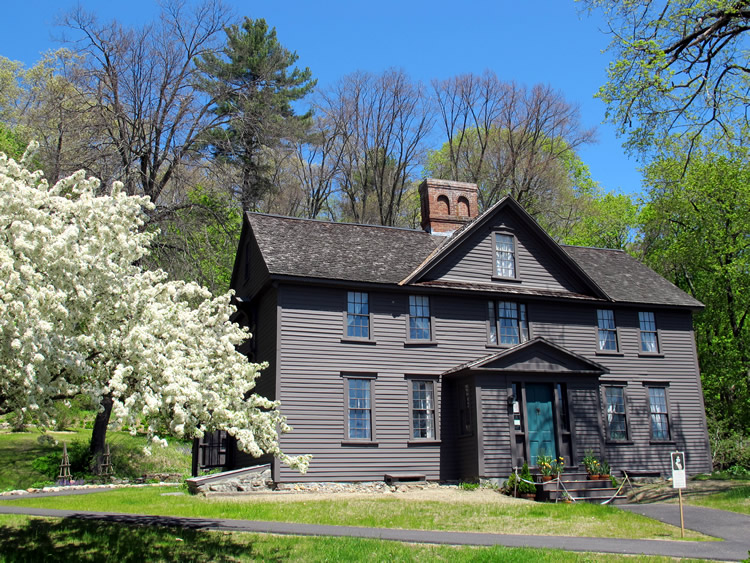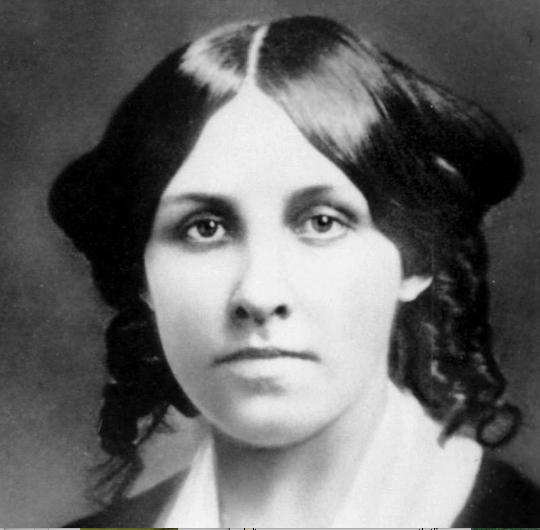Louisa May Alcott & Little Women
Daughter of an innovative educator, Alcott wrote Little Women, perhaps the most successful young adult novel of all time.
Louisa May Alcott (1832-1888) was born in Germantown PA, the second daughter (of four) of educator Amos Bronson Alcott and Abigail May Alcott.
From Boston to Concord
In 1834 the Alcotts moved to Boston where Bronson Alcott founded a school based on his forward-looking educational principles. When the school came to difficulties, in 1840 the Alcotts moved to Concord MA and rented the Hosmer Cottage on the Sudbury River. In 1843 they and six others moved to the Utopian Fruitlands cooperative (1843-44).
Hillside
The Alcott's Hillside, now The Wayside, Concord MA.
After the dissolution of Fruitlands, the Alcotts bought the Concord house they called Hillside (now The Wayside) and lived there from April 1845 till late 1848. Here, at age 13, Louisa had a room of her own. Many of the scenes and childhood plays depicted in Little Women took place in this room, and it was where she began to write her first book, Flower Fables.
Ralph Waldo Emerson, a great friend of her father's, was a mentor to her, and Henry David Thoreau was an avuncular friend.
Orchard House

Orchard House, Concord MA.
The Alcotts moved back to Boston in 1848, but returned to Concord and nearby Orchard House a decade later (1858-1877). It was here that Louisa wrote Little Women on a special writing desk built by her father.
Bronson Alcott was a brilliant thinker and conversationalist whose educational philosophies were far ahead of his time, but he was incapable of providing materially for his family. Poverty and want were ever present. Louisa resolved to go to work, earn money, and ease the burden on her longsuffering mother.
Louisa taught Emerson's daughters, telling them stories that she later collected and published as Flower Fables (1854). She later worked as a servant, a seamstress, a lady's traveling companion and many other simple jobs, but by 1860 she succeeded in having her stories published in the prestigious Atlantic Monthly magazine.
Civil War Service
With the outbreak of the Civil War, she volunteered as a nurse in the Union hospital near Washington DC, and wrote of her experiences in Hospital Sketches (1863). She contracted typhoid fever during her nursing, and was treated with calomel, which inflicted mercury poisoning that adversely affected her health forever after.
Novels
A year after Hospital Sketches, her first novel, Moods, was published, and by 1867 she was editing Merry's Museum, a children's magazine, and churning out sensational magazine stories, not for love but for money.
Little Women
In 1868 the first volume of Little Women was published. Its extraordinary success drove her immediately to begin on a second volume, which sold an astonishing 50,000 copies before it was even published. Little Women, mostly autobiographical, made her reputation, and its sequels Little Men (1871) and Jo's Boys (1886) were enthusiastically received.
Literary Success
From genteel but grinding poverty she had succeeded in becoming a literary celebrity, not to mention the 19th-century equivalent of a multi-millionaire. She bought a fine house on Boston's exclusive Louisburg Square and moved there with her aging father.
Her other books include Work (1873), Eight Cousins (1875), Roses in Bloom (1876) and Under the Lilacs (1879).
Poor Health
Her health was never robust after her nursing experience. Besides typhoid fever and mercury poisoning, she may have suffered from lupus erythematosis, a debilitating autoimmune disease.
Louisa's health had deteriorated markedly by the time she sat by her father on his death bed. Bronson Alcott died on March 4, 1888. Friends who came to offer their condolences two days later, on March 6, were alarmed to learn that Louisa, bedridden and in great suffering, had lapsed into a coma (perhaps from a stroke) and died on that very day, March 6, 1888. She was 55.
Louisa May Alcott's Grave
Grave of Louisa May Alcott, Sleepy Hollow Cemetery, Concord MA
Bronson Alcott, Louisa May Alcott and other members of the Alcott family are buried on Author's Ridge in Concord's Sleepy Hollow Cemetery (map). Louisa May Alcott's grave, decorated with the American flag in honor of her wartime service, is regularly visited by devoted readers, some of whom leave messages and tributes to the author.
Little Women—The Play
Little Women, one of the most beloved young adult novels of all time, has been translated into more than 50 languages. The story is performed as a play in Concord at the turn of every decade. It's not unusual for an amateur actor to play one of the Alcott girls in one decade's performance, and Marmie a decade or two later. The next performance will be presented in 2030.

